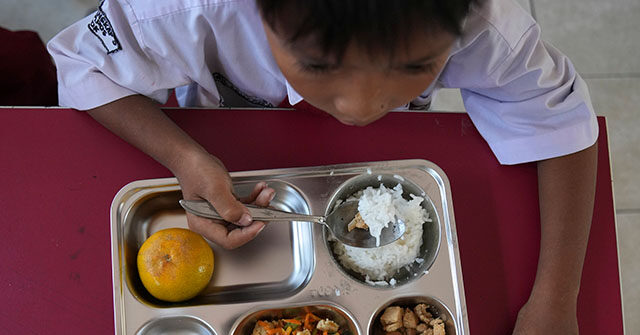Health experts on Monday urged the Indonesian government to suspend its program of free school meals after hundreds of children became sick from eating tainted food.
Indonesian President Prabowo Subianto made a nationwide free school lunch program one of the centerpieces of his election campaign, even though Indonesia’s shaky economy was already groaning beneath the weight of gigantic government spending, with high unemployment eating away at the tax base.
Supporters of the school lunch program said it was more urgently needed than ever because unemployment was rising and huge numbers of formerly middle-class Indonesians were slipping into poverty. Prabowo also said free meals were important because Indonesia had a high rate of stunted growth in children due to malnutrition.
“Through this initiative, our children will grow taller and emerge as champions,” he promised in 2023.
Economists predicted the cost of the program would skyrocket, draining funds from other important government projects, and health experts doubted the ability of the Indonesian government to provide healthy meals to children on a massive scale.
Both of those concerns were quickly validated. The cost of the program ballooned to almost $45 billion, forcing Prabowo to slash it down to a more manageable $28 billion this year. In comparison, the largest school meal program in the world is administered by India, which spends about $1.5 billion to feed 120 million children.
Indonesians were soon marching in the streets to protest the gigantic cost of the school lunch program, which they said was only making the economy worse, in addition to draining resources from other programs the protesters felt were more important. Ironically, the education ministry was one of the biggest victims of funding transfer, losing almost half of its budget to finance the free meals.
The first reports of food poisoning rolled in quickly. Sporadic cases began occurring in participating schools in February. Almost 80 students at two high schools south of the capital city of Jakarta became sick after eating Prabowo’s free meals in April. Some of them reported the food clearly smelled and tasted wrong.
Health experts feared the worst was yet to come, warning that the staggering levels of corruption and graft in the Indonesian government, combined with the poorly-planned and hasty launch of the meal program, was a recipe for disaster.
Last week, two school districts reported mass food poisoning from the free meals, affecting over 800 students at half a dozen schools. In West Java province, 569 students experienced nausea and vomiting after eating chicken and rice from the same free meals kitchen. About 30 of the students required hospitalization.
Health experts from six non-governmental organizations (NGOs) told a parliamentary committee on Monday that the total number of food poisoning cases across Indonesia reached 6,452 with the latest outbreaks.
Ubaid Matraji, head of the Network for Education Watch NGO, denounced the school lunch program as a “systemic failure.” Other experts blasted the program’s reliance on unhealthy “ultra-processed food” in addition to the outright cases of food poisoning, warning that inadequate nutrition could “trigger non-communicable diseases.
Most of the experts who testified agreed the lunch program should be suspended, at least temporarily, but the parliamentary committee insisted the program was “strategic” and would not be shut down. The National Nutrition Agency apologized for the food poisoning outbreaks and promised to investigate, but gave no indication it was prepared to suspend the program.
Read the full article here


